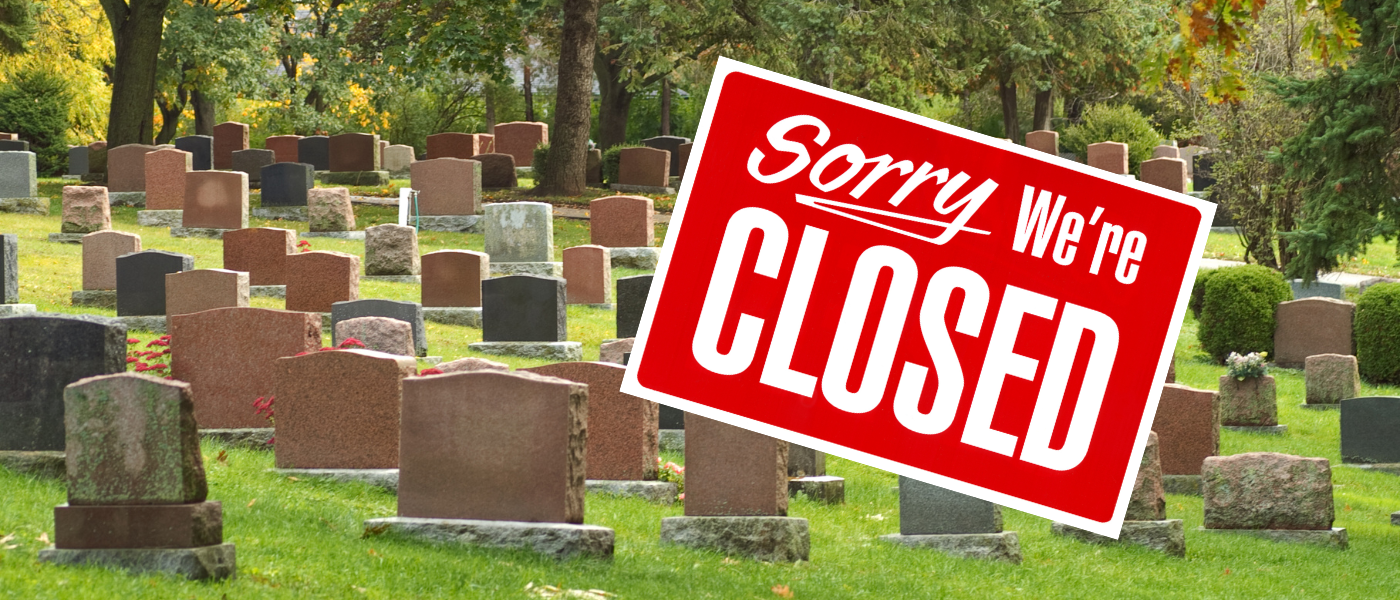Do Cemeteries Get Shut Down? Yep, and Here’s What Happens Next
What happens when a cemetery is closed, or is simply abandoned? Short answer: This is a complex legal question and the answer depends on the state and situation of the cemetery in question.
Cemeteries and burial grounds are regulated at the state level, and most states have a substantial set of laws applying specifically to lands dedicated to the burial of human remains. Within these bodies of law are multiple specific definitions for determining status (such as “closure” or “abandonment”). Details are significant to the options applicable in each case.
What happens to the graves in a closed or abandoned cemetery (however these are defined) is largely contingent upon the graveyard itself and the circumstances around its inactive status. Considerations generally include whether the graveyard in question poses a problem (such as a public hazard) or just a mess (for example, abandoned appearance with overgrown landscaping; irregular maintenance and access).
No matter what the locality, a few things might take place on a practical level: Grave contents may be moved to another location: crypts, remains, headstones and all. Or if the grounds grow wild and unkempt, plots sinking, markers decaying and collapsing, the municipality may seize control and assume responsibility for its upkeep (reimbursable, in most cases, since most cemeteries have a maintenance escrow fund specifically for the upkeep and care of the grounds).
The fine print
There are a lot of laws affecting burial matters, but a contingency common to such laws in most places is that a family does not own the piece of cemetery land designated in a plot purchase – only the right to bury or place human remains there.
The cemetery or whomever acts in its interests generally retains the right to move or relocate remains. (Public authorities hold ultimate power, however, including the ability make decisions affecting a burial ground’s status.)
Likewise, ironically, cemetery owners typically don’t own the land a cemetery is built on; instead, they own a license enabling the area to operate like a cemetery: to conduct burials and cemetery-related business transactions, such as gravedigging, interments, and sales of plots. It’s the responsibility of those holding the license to maintain the appearance of the cemetery, which must remain recognizable to the public as a cemetery to retain its licenses.
Public or private?
What happens to a cemetery which is no longer burying the dead depends on the nature of the cemetery itself, as well as its location.
If it’s a place on, say, a farm or other piece of family property where generations of the landowners’ relatives have been interred (as was historically the case in the US for decades, particularly in the south), there are different considerations than there are for established public burial grounds in metropolitan areas where plots were available for purchase by the public (in such places, there’s a predisposition toward leaving the place and its graves undisturbed).
Case study: Lincoln Memorial Park
Recently, the community of Carson, California faced this issue when a cemetery in Los Angeles County locked its gates without warning, denying access to families attempting to visit their loved ones there. After investigation, the cemetery was determined to be abandoned; its current licenses were revoked, and the matter is now in the hands of the local government to determine a new overseer.
Cemeteries may cease normal operations for many reasons: maybe the grounds reach capacity and no new burials are possible; perhaps there’s death or disability of the license holders, and upkeep is discontinued. Or if graves and grounds simply aren’t maintained, a municipality may step in and declare a cemetery abandoned.
Whatever the precipitating factor, there’s a fairly rigid system in place throughout most of the US for maintaining continuity and access making the matter one, ultimately, of community… and that’s kind of nice, when even a community still counts its dead as its citizens.




